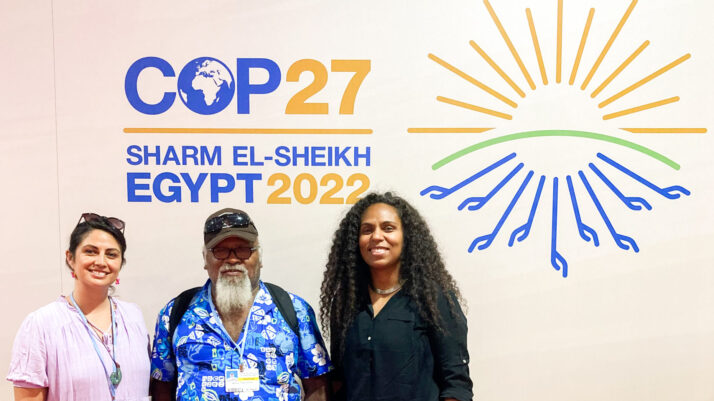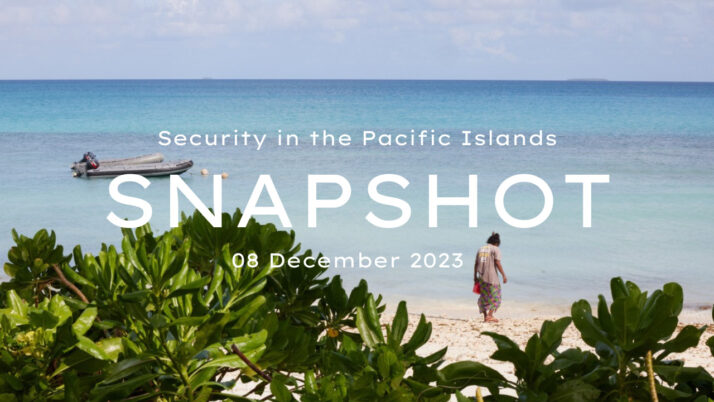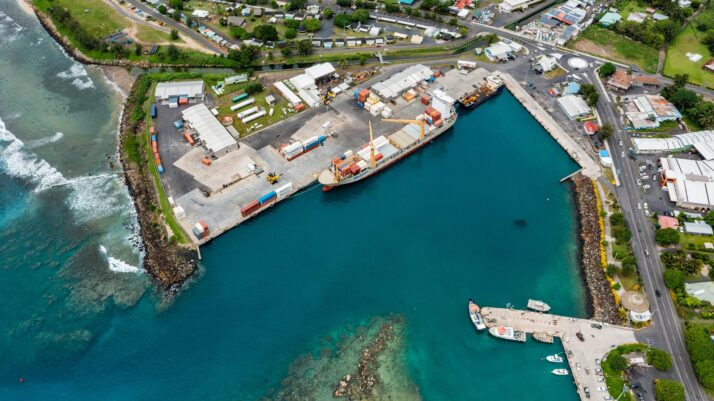Reflections on COP27: Why Indigenous peoples’ representation matters
A Tahitian PhD student shares her experience of seeing some Pacific territories represented by colonial countries at COP27.

The author, PhD candidate Vehia Wheeler (Left), poses with fellow Pacific delegates at COP27. Photo: ANU
The Pacific region or Oceania, which starts from Asia in the east and expands all the way to the Americas in the West, covers one-third of the world. A third of the world is mostly a great, large ocean. Within this expanse of blue waters is a variance of islands big and small, and a multitude of diverse cultures and languages.
I come from one of those islands – Tahiti in the South Pacific.
My doctoral research at ANU is driven by my identity and how it’s intertwined with the Pacific Ocean and the many complex changes it’s experiencing due to climate change. The research I do gave me the opportunity to attend COP27 in Sharm el-Sheikh, Egypt in November to improve my understanding of climate change and its impact and also the ways countries and grassroots activists are dealing with, and reacting to, these changes.
While at COP27, I made it a priority to search out our Pacific brothers and sisters who attended and could represent as part of their country.
Fourteen independent Pacific states can sit at negotiating tables to represent their own island countries; however, the other Pacific territories fall under the international and colonial jurisdiction of colonial countries.
I’m part of one of those territories, where Tahiti sits as a territory of France, which then falls under European Union representation. This means that while Tahiti has one of the largest maritime territories in the Pacific, we have no direct representation at the negotiating table, and are at the mercy of EU wishes and desires.
While the Pacific is one-third of the world, the independent states do not represent this one-third equally, but only a fraction of it. The rest is still represented by other colonial powers – the US, France, Australia, Chile or New Zealand whose voice is heard over Indigenous peoples and the local communities of these islands.
This is where the importance of the Local Communities and Indigenous Peoples Platform (LCIPP) caucus comes into play. LCIPP advocates and pushes for representation and policy change in the negotiation space for Indigenous peoples who do not have international representation for themselves. This platform covers the seven regions of the world – the Arctic; the Pacific; Africa; North America; Central and South American and the Caribbean; Eastern Europe, Russian Federation, Central Asia and Transcaucasia.
As LCIPP carried on over the three weeks at COP27, several similar themes consistently came up from Indigenous peoples worldwide—themes that I could relate to and were very similar to my situation.
Indigenous peoples discussed why defining countries by Westphalian nation-state definitions and boundaries does not represent the Indigenous peoples of those countries. The need to protect Indigenous peoples and their homelands from deforestation and invasive and destructive mining for fossil fuels was also tackled, along with Indigenous-led solutions to climate change and funding.
I could relate to what my other Indigenous brothers and sisters were expressing in frustration, anger and hope. If we are to adapt to climate change in our own islands and our own lands, can we do so without political representation? And if so, how?
This is what drove me to follow international negotiations on adaptation, and especially follow the EU’s stance as it is ultimately our own stance for our islands in Tahiti. The results of the negotiations had some successes, such as the agreement to the Loss and Damage fund. But worldwide, we still need to push for the phase out of fossil fuels and full commitments towards clean, renewable energies in all countries.
We need to keep worldwide temperature rising to no less than 1.5 degrees Celsius, or there will be very, very severe impacts on the Pacific and the world.
Indigenous Peoples and Pacific peoples are on the frontlines of these changes, so we must continue to follow the changes and fight for our rights to continue to live on our lands.
I will continue my research on Tahiti and the importance of Indigenous-led solutions, using the most appropriate Indigenous methods.
I will continue to follow COP, and I hope to attend COP28 in Dubai in 2023. I hope that at least two other Mā’ohi (Tahitian) youths who are interested in this subject can come with me, so we can observe what is being said in our name and ensure our peoples’ voices are heard.
Vehia Wheeler
PhD candidate in Pacific Studies
The Australian National University
More Stories

Security Snapshot - 11 Dec 2023
Pacific Security Snapshot | 08 December 2023
The security stories shaping the region Outcomes from 52nd Pacific Islands Forum Leaders’ Meeting in Cook Islands 12th General Assembly of the Pacific Conference of Churches Australia-Tuvalu Falepili Union signed Pacific climate change advocacy at COP28 EU-ACP Samoa Agreement signed Solomon Islands hosts 2023 Pacific Games First PNG woman for peacekeeping duties Regionalism The Fifty-Second…

Blog - 25 Oct 2023
Australia must play a key role in the Pacific’s push to decarbonise shipping
There is an opportunity for Australia to work with Pacific islands to invest in new technology and take a leadership role in the decarbonisation of shipping in the region. Pacific leaders have stated their priority to transition to a fossil fuel free Pacific. Collectively they recently failed at getting the International Maritime Organisation (IMO) to…






